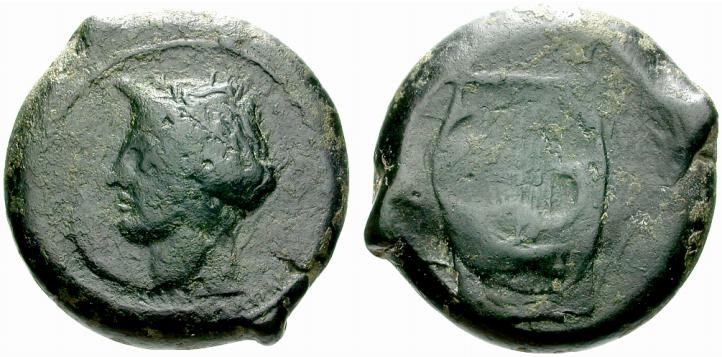Adranum (Campanian mercenaries), bronze, hemilitrae (Apollo/lyre) (354-344 BCE)
From SILVER
354 BCE - 344 BCE Bronze
Description
| ObverseInscription or printing placed on the obverse.: | (Greek).Laureate head of Apollo to left. |
| ReverseInscription or printing placed on the reverse.: | ΑΔΡΑΝΙΤΑΝ (Greek).Cithara |
Mint and issuing power
| MintIdentifies the place of manufacture or issue of a numismatic object.: | Adranum | Ancient regionAncient region.: | Sicily | Modern countryModern country: Italy | AuthorityIdentifies the issuing power. The authority can be "pretended" when the name or the portrait of X is on the coin but he/she was not the issuing power. It can also be "uncertain" when there is no mention of X on the coin but he/she was the issuing power according to the historical sources: | Campanian mercenaries |
Chronology
| FromIdentifies the initial date in a range assigned in a numismatic context. | 354 BCE | toIdentifies the final date in a range assigned in a numismatic context.. | 344 BCE | PeriodTime period of the numismatic object.: Classical 480-323 BC |
Physical description
| MetalThe physical material (usually metal) from which an object is made.: | Bronze |
Median weightMedian of the weights of numismatic objects (in grams). in grams | 30.50 | DenominationTerm indicating the value of a numismatic object. Examples: tetradrachm, chalkous, denarius.: | hemilitron | StandardStandard.: |
Image

S 1466 - Adranum, bronze, hemilitrae (354-344 BCE).jpg [1]
References
| Die study referencePublication of the study: | Castrizio 20001Castrizio 2000, p. 97-98 | ||
| Coin series referenceReference to coin series study: | HGC 22HGC 2, n° 37 | ||
| Coin series web referenceCoin series web references: | |||
Obverse dies distribution
| FrequencyFrequency of specimen in distribution. ᵖ | Number of obversesNumber of obverse dies. ᵖ (o) | % (o) | Number of coinsNumber of coins. (n) | % (n) | Die nameName(s) of the die(s). |
| 1 | 2 | 28.57 | 2 | 6.67 | 7;8 |
| 3 | 1 | 14.29 | 3 | 10 | 5 |
| 4 | 1 | 14.29 | 4 | 13.33 | 3 |
| 5 | 1 | 14.29 | 5 | 16.67 | 6 |
| 6 | 1 | 14.29 | 6 | 20 | 1 |
| 10 | 1 | 14.29 | 10 | 33.33 | 2 |
| Total | 7 of 7 | 100.02 | 30 of 30 | 100 |
Reverse dies distribution
no distribution is available
Quantification
| Number of obversesNumber of obverse dies. ᵖ (o) | 7 | Number of singletons (o1)The number of singleton coins. ᵖ | 2 |
| Number of reverse diesNumber of reverse dies. (r) | 11 | Number of coinsNumber of coins. (n) | 30 |
| Coins per obverse dieNumber of coins per obverse die. (n/o) | 4.29 | Coins per reverse dieNumber of coins per reverse die. (n/r) | 2.73 |
| Reverse per obverse ratioRatio of obverse dies divided by reverse dies. (r/o) | 1.57 | Percentage of singletons (o1)number of coins (n) divided by the number of singletons (o1) ᵖ | 28.57 % |
| Original number of dies (O) (Carter 1983 formula)The estimation of the number of coins according to Carter 1983 ᵖ | 8.02 | Coins struck if 20,000 as average productivity per dieCoins made if the average productivity for obverses (according to Carter) is 20,000. ᵖ | 160,400 |
| Original number of dies (O) (Esty 2011 formula)The estimation of the number of coins according to the singleton formula in Esty 2011 ᵖ (O) | 9.13 | Survival rate if 20,000 as average productivity per dieSurvival rate if average productivity is 20,000. ᵖ | 0.00019 |
| Coverage (o = % of O) (Esty 1984 formula)Esty 1984 - coverage (% of O) ᵖ (o = % of O) | 93.33% | Die productivity if survival rate 1/2,000Average productivity if survival rate is 1/2,000. ᵖ | 7,481.3 |
| Weight of silver (in kg) if 20,000 coins per die (O = Carter formula)Carter 1983 * Median weight * 20000 (*10 if gold or electrum) ᵖ | n.a. | Die productivity if survival rate 1/5,000Average productivity if survival rate is 1/5,000. ᵖ | 18,703.24 |
Remarks
Most likely one single workstation Likely military
References
- ^ Castrizio, Daniele (2000), La monetazione mercenariale in Sicilia. Strategie economiche e territoriali tra Dionisio I e Timoleonte, Catanzaro, Soveria Mannelli, 126 p. and 18 pl.
- ^ Hoover, Oliver D. (2012), The Handbook of Greek Coinage Series. 2. Handbook of the Coins of Sicily (Including Lipara). Civic, Royal, Siculo-Punic, and Romano-Sicilian Issues. Sixth to First Centuries BC, Lancaster-London, 489 p.